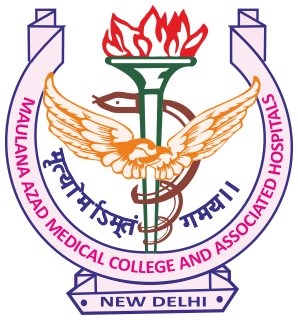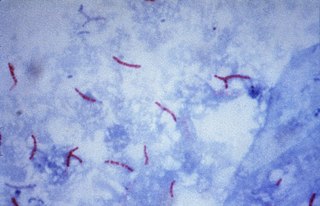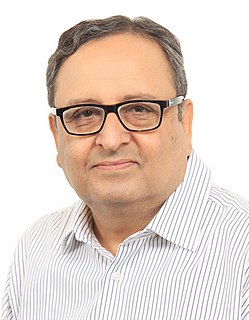
Tuberculosis (TB) is an infectious disease usually caused by Mycobacterium tuberculosis (MTB) bacteria. Tuberculosis generally affects the lungs, but it can also affect other parts of the body. Most infections show no symptoms, in which case it is known as latent tuberculosis. Around 10% of latent infections progress to active disease which, if left untreated, kill about half of those affected. Typical symptoms of active TB are chronic cough with blood-containing mucus, fever, night sweats, and weight loss. It was historically referred to as consumption due to the weight loss associated with the disease. Infection of other organs can cause a wide range of symptoms.

Tuberculosis management refers to the medical treatment of the infectious disease tuberculosis (TB).

Maulana Azad Medical College (MAMC) is a medical college in New Delhi, India affiliated to University of Delhi and run by the Delhi government. It is named after Indian freedom fighter and first education minister of independent India Maulana Abul Kalam Azad. It was established in 1959 at Bahadur Shah Zafar Marg near Delhi Gate.

Multidrug-resistant tuberculosis (MDR-TB) is a form of tuberculosis (TB) infection caused by bacteria that are resistant to treatment with at least two of the most powerful first-line anti-TB medications (drugs), isoniazid and rifampin. Some forms of TB are also resistant to second-line medications, and are called extensively drug-resistant TB (XDR-TB).

Tuberculosis is a serious public health problem in China. China has the world's third largest cases of tuberculosis, but progress in tuberculosis control was slow during the 1990s. Detection of tuberculosis had stagnated at around 30% of the estimated total of new cases, and multidrug-resistant tuberculosis was a major problem. These signs of inadequate tuberculosis control can be linked to a malfunctioning health system. The spread of severe acute respiratory syndrome (SARS) in 2003, brought to light substantial weaknesses in the country's public health system. After the government realized the impact that the SARS outbreak had on the country, they increased leadership in their health department. After the SARS epidemic was brought under control, the government increased its commitment and leadership to tackle public health problems and, among other efforts, increased public health funding, revised laws that concerned the control of infectious diseases, implemented the world's largest internet-based disease reporting system to improve transparency, reach and speed, and started a program to rebuild local public health facilities and national infrastructure.
World Lung Foundation (WLF) is a non-profit foundation established in 2004 to support private organizations and government agencies, who work to improve lung health, predominantly in low- and middle-income countries.

Sivaramakrishna Iyer Padmavati was an Indian cardiologist. She was director of the National Heart Institute, Delhi, and the founder president of the All India Heart Foundation. The institute collaborates with the World Health Organization (WHO) in training students in preventive cardiology. Padmavati was awarded India's second highest civilian honour, the Padma Vibhushan in 1992. Padmavati, an elected fellow of the National Academy of Medical Sciences, was the first woman cardiologist in India and established the first cardiac clinic and cardiac catheter lab in India.

Tuberculosis in India is a major health problem, causing about 220,000 deaths every year. In 2020, the Indian government made statements to eliminate tuberculosis from the country by 2025 through its National TB Elimination Program. Interventions in this program include major investment in health care, providing supplemental nutrition credit through the Nikshay Poshan Yojana, organizing a national epidemiological survey for tuberculosis, and organizing a national campaign to tie together the Indian government and private health infrastructure for the goal of eliminating the disease.

Pramod Kumar Julka, is an Indian cancer specialist (oncologist), medical educationist and writer, known for performing the first peripheral blood stem cell transplant following high dose chemotherapy in Metastatic Breast Cancer in India. He was honoured by the Government of India, in 2013, by bestowing on him the Padma Shri, the fourth highest civilian award, for his contributions to the fields of medicine and medical education. The American Society of Clinical Oncology (ASCO) has awarded him by bestowing on him the honorary membership.
Ganesh Kumar Mani is an Indian cardiothoracic and vascular surgeon, reported to have performed over 20,500 Coronary artery bypass surgeries. He was honoured by the Government of India, in 2013, by bestowing on him the Padma Shri, the fourth highest civilian award, for his contributions to the fields of medicine and medical education.
Pawan Raj Goyal is an Indian pulmonologist who gained his post graduate degree from Harvard Medical School, Boston. The Government of India honoured him, in 2014, with the award of Padma Shri, the fourth highest civilian award, for his contributions to the fields of medicine.

Mahesh Verma is an Indian prosthodontist and the Director and Principal of Maulana Azad Institute of Dental Sciences. He is the Vice Chancellor of Guru Gobind Singh Indraprastha University. The Government of India awarded him, in 2014, with the Padma Shri, the fourth highest civilian award, for his contributions to the fields of medicine,
Yash Gulati is an Indian orthopedic surgeon and the senior consultant orthopaedic surgeon at Indraprastha Apollo Hospitals, New Delhi. He specializes in joint replacement and spine surgeries and is a visiting consultant at RAK Hospital, Ras al-Khaimah. He is the youngest orthopedic surgeon to win the civilian honour of the Padma Shri.
Prem Chandra Dhanda was an Indian physician and a medical academic. He was the principal of the Maulana Azad Medical College, New Delhi and the director of G. B. Pant Hospital, New Delhi. The Government of India awarded him the third highest civilian honour of the Padma Bhushan, in 1962, for his contributions to medicine.
Badri Nath Tandon is an Indian gastroenterologist, hepatologist, medical researcher and academic, and the Chairman and Senior Consultant of Gastroenterology, at Metro Hospitals and Heart Institute, Noida. He is a former Professor and Head of Department of Gastroenterology and Human Nutrition Unit at the All India Institute of Medical Sciences, Delhi (AIIMS) and a former Director and Senior Consultant of Hepatology and Gastroenterology at Pushpawati Singhania Research Institute for Liver, Renal and Digestive Diseases, New Delhi. He is a recipient of several awards including Sasakawa WHO Health Prize and Jubilee Medal of the RAMS. The Government of India awarded him the third highest civilian honour of the Padma Bhushan, in 1986, for his contributions to medicine.
Daljeet Singh Gambhir is an Indian cardiologist, medical academic, researcher and inventor and the Group Director of Cardiology at Kailash Group of Hospitals and Heart Institute, Delhi. He is the inventor of Infinnium Paclitaxel-Eluting Stent, a reportedly cheaper drug-eluting stent which he first presented at the EuroPCR meeting held in Paris in 2003. A fellow of the National Academy of Medical Sciences and an honorary fellow of the Indian College of Cardiology, he is reported to have performed over 10,000 coronary interventions. The Government of India awarded him the fourth highest civilian honour of the Padma Shri, in 2016, for his contributions to medicine.

Kamal Kumar Sethi is an Indian cardiologist, medical academic and administrator, known for the performance of the first catheter ablation in India. He is the chairman and managing director of Delhi Heart and Lung Institute and a former president of the Cardiological Society of India and the Indian Society of Electrocardiology. He is a recipient of several honors including the Legend in Cardiology Award of the Delhi Medical Association and Andrew Gruentzig Distinguished Interventional Cardiologist Award of the Cardiovascular Society of India. The Government of India awarded him the fourth highest civilian honour of the Padma Shri, in 2006, for his contributions to medical science.
Santosh Kumar Sen (1910–1979) was an Indian surgeon and the president of the Association of Surgeons of India. He was the first Indian surgeon to be elected to the Fellowship of the Royal College of Surgeons of England.
Gopal Krishna Vishwakarma, more popularly known as G K Vishwakarma, was an eminent orthopedic surgeon, academician and public health administrator. He was the Director General of Health Services from October 1986 to his retirement in October 1992. He was awarded the Silver Jubilee Award (1983) and the Dr. B. C. Roy Award by Medical Council of India, The Government of India, in recognition of his contributions to the field of medicine and public health honored him with the Padma Shri (1985) one of India's highest civilian awards in India.
Digambar Behera is a doctor from Cuttack, Odisha, India. His specialization is in pulmonary diseases. In 2020, he received the Padma Shri honour from the Government of India for his contribution to the field of medicine.










